THE BLOG TO VISIT...GET ACCURATE,PRECISE INFORMATION ON HEALTH,SPORTS,RELIGION,NEWS AROUND THE GLOBE,ETC
Wednesday 21 May 2014
Wednesday 14 May 2014
Nigeria soldiers 'fire at army commander in Maiduguri'
Nigeria soldiers 'fire at army commander in Maiduguri'
 Soldiers say they lack the firepower to tackle insurgents
Soldiers say they lack the firepower to tackle insurgents
Soldiers in Nigeria have opened fire on their commander in the north-eastern city of Maiduguri, witnesses say.
Maj-Gen Ahmed Mohammed escaped unhurt after soldiers shot at his car at the Maimalari barracks, the sources said.The soldiers blamed him for the killing of their colleagues in an ambush by suspected Boko Haram militants.
Meanwhile, Nigeria's president has ruled out freeing Boko Haram prisoners in exchange for the release of more than 200 kidnapped schoolgirls.
A government minister had earlier said authorities were ready to negotiate with Boko Haram, but President Goodluck Jonathan insisted on Wednesday that this was out of the question.
"He made it very clear that there will be no negotiation with Boko Haram that involves a swap of abducted schoolgirls for prisoners," said British Africa Minister Mark Simmonds after meeting Mr Jonathan in the capital, Abuja, to discuss an international recue mission for the girls.
Their kidnapping in Borno state on 14 April has caused international outrage, and foreign teams of experts are in the country to assist the security forces in tracking them down.
'Internal matter' Army spokesman Maj-Gen Chris Olukolade described the incident in Maiduguri, the capital of Borno state, as an internal matter and said there was no need for public concern.
But the shooting shows that morale within the army is low as it battles Boko Haram, says BBC Nigeria analyst Naziru Mikailu.

President Jonathan has asked parliament to extend the emergency for another six months.
According to sources who were inside the Maimalari barracks, the soldiers accused Maj-Gen Mohammed of putting their lives and the lives of their families at risk by failing to ensure that they were well-equipped to tackle Boko Haram.
They also alleged that the military top brass had failed to give them a promised special allowance for fighting on the front line, they told the BBC Hausa service.

Cannot play media. You do not have the correct version of the flash player. Download the correct version
The world is watching to see what Nigerian President Goodluck Jonathan will do next
UK Prime Minster David Cameron has offered to send a spy plane to Nigeria to help in the hunt.
Meanwhile, residents of three villages in Borno repelled an attack by suspected Boko Haram fighters on Tuesday, an eyewitness told the BBC.
About 200 militants were killed during the fighting in the Kala-Balge district of Borno state, he said.
The witness, who asked not to be named because of security concerns, said the residents had formed a vigilante group.
Boko Haram, whose name means "Western education is forbidden" in the local Hausa language, is notorious for raiding towns and villages, burning homes, looting banks and police stations, and killing people.

Boko Haramm :Kidnapped girls: what you can do to help
-- #BringBackOurGirls has now been tweeted
more than a million times across the world, as global outrage over the
kidnap of hundreds of Nigerian schoolgirls grows.
Shock has given way to
anger as thousands in cities everywhere took to the streets to demand
the Nigerian government, and other authorities, do more to rescue them.
"The Nigerian girls are
my sisters," said Malala Yousafzai, who after being shot in the head by
the Taliban for going to school launched The Malala Fund, which raises
money for girls' education initiatives globally.
The Malala Fund has now launched a Nigerian girls education campaign to support Nigerian organizations which are working to promote girls' schooling around the country.
Indeed, "Boko Haram"
translated means "Western education is sin." The militant group is one
of many that threaten the efforts of girls worldwide to go to school,
and to change their circumstances.
CNN's Girl Rising
looked at just some examples of the obstacles that many of the more
than 600 million adolescent girls living in developing countries face
every day -- obstacles that prevent them from going to school, from
freedom, and from simply being a child.
There are many ways to
help girls, like those kidnapped in Nigeria, who face persecution,
violence, poverty and other barriers to education.
GIVE
CNN and Impact Your World
don't accept donations but do help you find reputable places to give
your money and time. "CNN's Girl Rising" was the centerpiece of 10x10, a
global campaign to educate and empower girls. It created the 10x10 Fund for Girls' Education.
Donations to this fund
are distributed evenly among the film's nonprofit partners. Many of the
girls profiled in the film were helped by these organizations, and the
groups continue to work for girls' education in developing countries. As
little as $50 can educate a girl for a year.
CARE USA works
to help educate girls in some of the poorest, most desperate parts of
the rural areas in the mountains of Peru. Senna from "Girl Rising" was
helped by this organization.
GirlUp -- United Nations Foundation is a campaign inspiring American girls
to take action for girls in countries such as Ethiopia, Guatemala and
Liberia who face a lack of access to education and are susceptible to
child marriage, high maternal death rates and HIV infection.
The U.N. also spearheads the Girls' Education Initiative, a partnership of organizations that hope by 2015, children everywhere can complete free primary schooling.
Partners in Health
has worked in places such as Haiti, Rwanda, Malawi and Lesotho. They
try to help all children, especially girls, receive the health care and
social support needed to go to school. Wadley from "Girl Rising"
benefits from Partners in Health's work in Haiti.
Plan International USA tries to give girls around the world access to food, water, education, financial security
and protection from sexual violence and exploitation. Yasmin, the girl
in Egypt in "Girl Rising," was part of a Plan International USA program
helping to keep street girls safe.
Room to Read
focuses on helping young girls develop literacy skills and a habit of
reading. Their hope is to create a legacy of gender-equal education in
developing countries such as Nepal and Cambodia. Suma from "Girl Rising"
had the chance to learn because of Room to Read.
World Vision
supports girls' education in many countries through many initiatives.
Two of the girls in "Girl Rising" are World Vision-sponsored children:
Ruksana from India and Azmera from Ethiopia.
"Education is truly a
girl's best chance for a bright future," First Lady Michelle Obama said
in her weekly address, "not just for herself, but for her family and her
nation."
The road to Boko Haram's heartland
Ahead of the rain-lashed vehicles, tree branches
lay across the road. We'd encountered countless military, police and
vigilante checkpoints but now we were in Boko Haram's backyard, we
worried if the checkpoints were being replaced by ambushes.
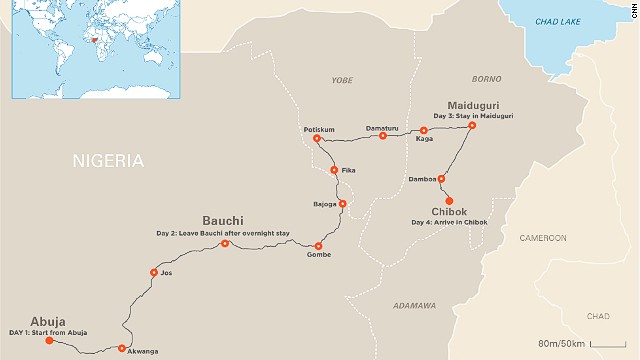 Map: Nima Elbagir's route to Chibok
Map: Nima Elbagir's route to Chibok
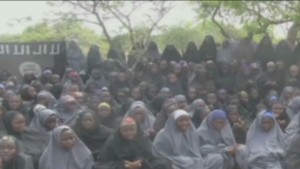 New video allegedly shows Nigerian girls
New video allegedly shows Nigerian girls
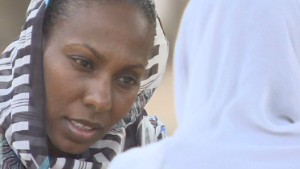 Exclusive interview with kidnapped girl
Exclusive interview with kidnapped girl
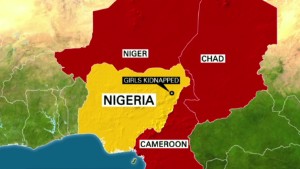 Complications in the search for Nigerian girls
Complications in the search for Nigerian girls
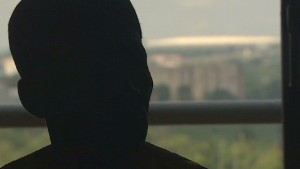 Nigerian father: Nothing has been done
Nigerian father: Nothing has been done
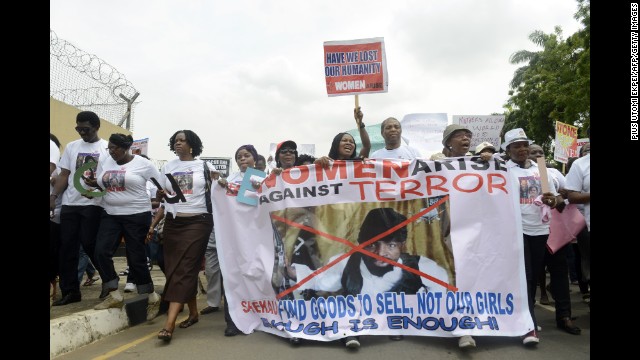 Photos: Nigerians protest over kidnapped girls
Photos: Nigerians protest over kidnapped girls
After the kidnapping of
more than 200 schoolgirls from a school in northern Nigeria, the whole
world's attention was focused on one village - Chibok -- but CNN was the
first news organization to send a team to the scene of the atrocity.
Setting up interviews
with those impacted by the mass abduction was quite a task, but once in
place, the bigger challenge became "how do we safely get there." I have
covered conflict zones before and always focus on the stories we'll hope
to get, rather than the potential danger. That's how I deal with the
fear.
We were trying to find
security escorts, but no one was willing to journey to Chibok, which is
situated in Borno State -- one of the three states considered to be the
heartland of Boko Haram.
 Map: Nima Elbagir's route to Chibok
Map: Nima Elbagir's route to Chibok
The militant Islamist group has bombed schools, churches and mosques; kidnapped women and children;
and assassinated politicians and religious leaders. It was unlikely
they would welcome Western journalists, and those accompanying us, with
open arms.
The journey from the relative safety of Nigeria's capital, Abuja, to the remote countryside stalked by Boko Haram can take 8 to 10 hours, but logistics and security concerns meant that it took us four days.
We traveled in two cars -- 4x4s to handle the terrain.
Even before we reached the militant-plagued area, we suffered setbacks. In Bauchi State, a tire on the first car blew-out, causing it to lose control.
Now we were down one car.
It was hours before we could find a resident willing to lend his
rundown car to us and to travel to Chibok. Eventually this car broke
down and had to be abandoned.
During the day, Chibok looks like a normal village. But at night is when you see the fear and terror.
Lillian Leposo
Lillian Leposo
'Why did I come?'
When we entered Borno State, we were hit by a violent storm.
We could see absolutely
nothing as strong rains lashed our vehicles. Night had fallen, we were
still far away from our destination of the state capital Maiduguri and
our driver was unfamiliar with the road. We couldn't see to the side, behind or ahead.
While covering stories
in other conflict zones, there have been instances when the danger was
so apparent that I wondered - "Why did I come?" For this story, it was that night as we entered Borno State -- in the dark during a strong storm.
The situation was all
the more eerie because the storm had brought down branches across the
road and we wondered if we were being set up for an ambush.
Eventually, however, we did arrive in the relative safety of Maiduguri, the state's capital, only to encounter another hurdle.
 New video allegedly shows Nigerian girls
New video allegedly shows Nigerian girls
 Exclusive interview with kidnapped girl
Exclusive interview with kidnapped girl
 Complications in the search for Nigerian girls
Complications in the search for Nigerian girls
 Nigerian father: Nothing has been done
Nigerian father: Nothing has been done
We had organized a
police escort to accompany us for the final, most dangerous leg from
Maiduguri south to Chibok. The road is notorious for ambushes and
attacks by Boko Haram.
As we readied to journey
along it on our third day, our police escort said they could not take
us because that morning it had been the scene of a shootout between the
militants -- who had come from raiding a village - and security forces.
One of the officials had been shot in the neck.
Beyond the checkpoints
By the time we left with a police escort the following day, it was about noon.
 Photos: Nigerians protest over kidnapped girls
Photos: Nigerians protest over kidnapped girls
Our route had all been tarmac until the town of Damboa, from where the road leads to Chibok.
From that point, there's
no tarmac whatsoever. Drivers are forced to swerve left and right to
avoid the potholes caused by the heat and it's really rough terrain --
savannah.
Damboa also hosted the last security checkpoint we encountered.
Prior to that we had
been forced to stop constantly. There would be a military checkpoint, a
few minutes later a police checkpoint and then a few minutes later a
vigilante checkpoint -- staffed by local men armed with machetes looking
out for Boko Haram.
But on the road to the
village now the focus of the whole world's attention because of the
atrocity that took place there -- there was nothing, not one checkpoint.
We were driving through a
vast area of open land, high grass and shrubs. And there was no
homestead in sight. Any checkpoint set up by the security forces would
basically make them sitting ducks for the insurgents.
Our convoy was on its own.
Our police escorts were
armed with AK-47 rifles and we had flak jackets on the seats beside us
-- kept out of sight so as not to raise questions about our purpose --
but our main defense was to drive as fast as possible along the pitted
road for the 45-minute journey.
A number of thoughts went through my mind; this was the road to Chibok; militants could storm us from anywhere on that road.
It was a very scary
moment. And at the same time I kept thinking, "how is it possible that
there is no single security check point towards this village? Not even
one?"
Arriving in Chibok we
found a spread-out village with a vibrant market with residents buying
and selling food stuffs. The most popular stand, however, is the phone
charging stand - because there is no power in the homes.
Overnight stay
Our late departure meant
we had arrived in Chibok around 3pm and the police said it was too
dangerous to return along the same road so we had to sleep over in the
village. That wasn't part of the plan. Ever.
We were offered guest
huts to stay in. But we declined as our presence would be so obvious --
and of course we didn't want to be with the police because if there was
an attack that would be where a shootout would be.
A very brave local
family hosted us, providing us with mats to sleep outside. A village
that has lost so much still found reserves of humanity to offer us
hospitality.
During the day, Chibok
looks like a normal village. But at night is when you see the fear and
terror. The women, elderly and children go to sleep. And the young men
stay awake, doing patrols, keeping vigil.
CNN's team joined them,
and discovered that one thing was clear: Chibok residents have stopped
waiting for the government, they are protecting their own.
*CNN's Nima Elbagir's report on the Chibok night patrol will be published on CNN.com Tuesday
U.S. support to Nigeria beset by complications
The United States is now using drones and manned surveillance
aircraft over Nigeria in the search for the hundreds of schoolgirls
kidnapped by Boko Haram.
 U.S. sends spy planes to help Nigeria
U.S. sends spy planes to help Nigeria
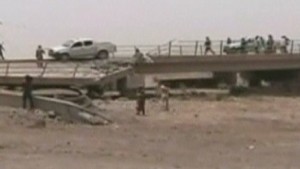 Frustrations build after Boko Haram attack
Frustrations build after Boko Haram attack
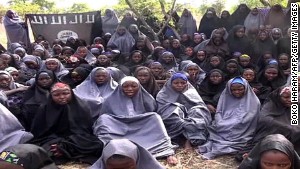 Nigeria: 54 girls ID'd in Boko Haram tape
Nigeria: 54 girls ID'd in Boko Haram tape
But signs of them are yet
to emerge, as the task is complicated by the possibility that the girls
have been separated into groups.
The U.S., which is supporting the Nigerian government's efforts, will continue to deepen its efforts, Defense Secretary Chuck Hagel said Wednesday while traveling to Saudi Arabia.
However, "I have seen no intelligence come back that I am aware of that shows that we've located those girls," he said.
 U.S. sends spy planes to help Nigeria
U.S. sends spy planes to help Nigeria
 Frustrations build after Boko Haram attack
Frustrations build after Boko Haram attack
 Nigeria: 54 girls ID'd in Boko Haram tape
Nigeria: 54 girls ID'd in Boko Haram tape
The assets provide some of the best tools to try to find the girls, but the Nigerian government has shown some reluctance to use U.S. help.
As it is, the U.S. is not sharing raw intelligence from its surveillance aircraft with Nigeria's armed forces.
This is because the
countries have still not established the intelligence-sharing protocols
and safeguards needed for an intelligence-sharing agreement, Pentagon
spokesman Col. Steve Warren said.
That said, the
intelligence gathered through the surveillance flights is being fed to
an interdisciplinary team on the ground, and that team is analyzing it
and providing advice to the Nigerian government, he said.
Warren added that the manned and unmanned aircraft being used are unarmed.
Pressure to find the girls
Wednesday marked one
month since the 276 girls were abducted from Chibok by Boko Haram. A
worldwide campaign to "bring back our girls" has spread awareness of the
incident, and as the days go by, the pressure to find them steps up.
U.S. Sen. John McCain, R-Arizona, is among those who support American military intervention to find the girls, if needed.
"You know, it's
interesting to me that when a ship is hijacked and taken into custody by
these pirates, we have ... no reservations about going in and trying to
take that ship back and the crew that's being held," he said. "We have
no compunctions about that."
When it comes to the hundreds of girls who were kidnapped, the response has been dragging, he said.
A U.S. military
operation "could be done in a way that is very efficient, but for us not
to do that, in my opinion, would be an abrogation of our
responsibilities," McCain said.
Two senior administration officials told CNN that it is premature to talk about a special operations incursion into Nigeria because the girls have not been found yet.
The U.S. military is there to advise and assist, but not to actively participate, the sources said.
If the girls are found, it would be up to the Nigerians to devise a plan and execute it with U.S. assistance, the sources said.
And that raises other complications.
The Nigerian military is
capable of carrying out a rescue operation, but there are concerns
because it has been heavy-handed in the past and killed many civilians,
the sources said.
As it currently stands,
U.S. law prohibits the U.S. military from working with Nigerian military
units that have been accused of abuses, a senior State Department
official said.
"We've been very clear
about our concerns about the Nigerian reports of and evidence of abuses
by the Nigerian military," the official said.
Even with all of these complications, the U.S. is committed to doing everything it can to find the girls, the official said.
Subscribe to:
Posts (Atom)